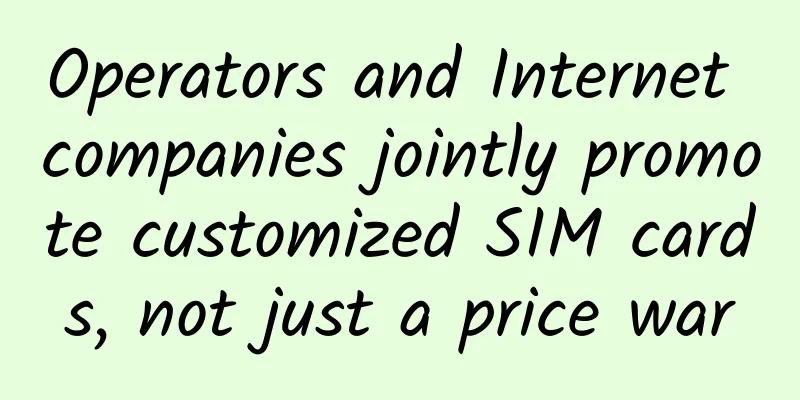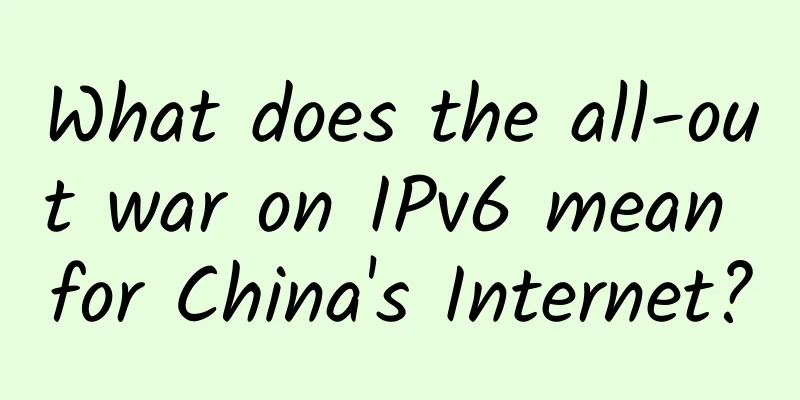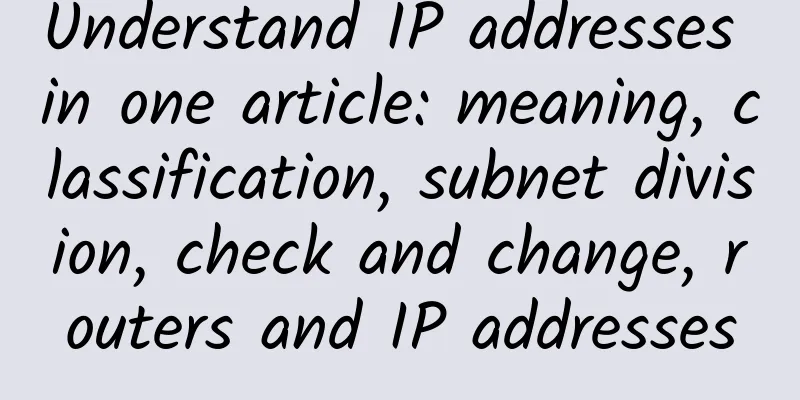Operators and Internet companies jointly promote customized SIM cards, not just a price war

|
In the competition among the three major telecom operators, some practices of China Unicom are often somewhat different from those of the other two. Recently, China Unicom and Tencent jointly launched a mobile phone card called "Tencent King Card", which triggered relevant discussions. Soon after, China Unicom and Alipay announced the joint launch of the mobile phone number brand "Ant Treasure Card". Personally, I think that China Unicom's move can be called "corporate customized SIM card service", thus advancing the personalized operation based on SIM cards one step further. This is a bold innovation that fully utilizes the advantages of pipelines and reasonably utilizes the competitive relationship between Internet companies. More importantly, this also marks that telecom operators have begun to try a new traffic backward business model from the card issuance link. The significance of this kind of enterprise customized SIM card is not just that it looks cheap, otherwise, for telecom operators, it is nothing more than a different way to fight a price war. Instead, it is to promote the backward model from the source of the pipeline, which belongs to the category of telecom operators' traffic backward business model. The key is whether it can bring higher value to telecom operators? This backward model innovation will help improve the competitiveness of customized enterprises, thereby achieving a win-win situation for telecom operators, customized enterprises and individual users. 1. Enterprise-customized SIM cards seem to be very cheap In mid-October 2016, China Unicom and Tencent jointly launched a targeted data package card for Tencent applications - "Tencent King Card". Similar to the discounts previously offered by China Unicom and other manufacturers, all data consumed by mobile phone users when using Tencent applications, such as WeChat, QQ, Tencent Video, QQ Music, and Tencent Games, is exempted. This is very attractive to heavy users of Tencent products, and it largely eliminates the fear of Internet traffic. In mid-November 2016, China Unicom and Alipay announced a strategic cooperation agreement and jointly launched the mobile phone number brand "Ant Treasure Card". Ant Treasure Card is divided into two types: Big Treasure Card and Small Treasure Card. Both new and old Unicom users on Alipay can get free mobile data, exclusive packages, exclusive numbers and other benefits. Ant Treasure Card also introduced Sesame Credit, and users' timely performance of contracts during use will help improve their credit. The package price of Ant Bao Card is lower than the official price of China Unicom, and the difference in the data volume within the package is as much as 3 times (in the official tariff introduction of China Unicom, the *** 4G package is 56 yuan, which can get 500MB of domestic data volume and 100 minutes of domestic voice calls. The domestic voice calls exceeding the package are 0.15 yuan/minute for the official package and 0.1 yuan/minute for the Dabao Card package). Tencent Dawang Card offers free data for Tencent applications, which means users do not have to worry about Internet data volume. The price of data volume exceeding the package is also very favorable. Therefore, both types of enterprise customized cards provided by China Unicom seem to further reduce the package charges, and they are cheap. 2. Will enterprise-customized SIM cards lead to another form of price war? According to some industry analysis and media reports, the common view on China Unicom's successive launch of the "Tencent King Card" and "Ant Treasure Card" is that China Unicom has launched a new round of price wars in an attempt to unite the power of Internet companies to promote number release. This is bound to trigger a strong counterattack from the other two companies, especially China Mobile. As a result, a PPT of an internal meeting of China Mobile, which was about its abnormal response to China Unicom’s extreme charges for the Tencent King Card series products, soon circulated on Weibo, WeChat groups and Moments (of course, judging from the analysis and countermeasures used in this version of the material about competitors, it doesn’t seem to be true. However, similar analysis, response and countermeasures definitely exist). This seems to mean that in order to snatch 4G users, the three major telecom operators will start a new round of price wars in the "life-and-death" issue of issuing cards and numbers, especially when major festivals such as Christmas, New Year's Day and Spring Festival are approaching. Will it really happen? Personally, I think it is unlikely. It is better not to engage in such a price war. More importantly, after the round of price war of "speeding up and reducing fees" last year, the three major telecom operators do not have the basis to continue to launch a large-scale price war for the time being. The main task at present is "speeding up", and "reducing fees" is secondary. More importantly, if the insiders of the three major telecom operators only regard the Tencent King Card and Ant Treasure Card launched by China Unicom as a signal of a price war, then it can only be said that such a judgment is regrettable. 3. The key to enterprise-customized SIM cards is to enhance the operator's backward business value In fact, from the in-depth interpretation of the tariff design of Tencent King Card and Ant Bao Card launched by China Unicom, it can be noted that if this type of enterprise customized SIM card is placed in the context of traffic business innovation, especially since 2013, China Telecom has established a special team of the comprehensive platform development and operation center to carry out business based on the backward traffic business model. The three major telecom operators have achieved good results in the backward traffic business model, and the traffic consumption based on the backward model has continued to double. Therefore, if the telecom operators treat China Unicom's move only at the level of price war for forward business release of numbers and cards, it seems that they lack business height and basic judgment. In my opinion, on the one hand, the innovative move of China Unicom to launch customized enterprise cards has pushed the traffic management of telecom operators to a new stage. Taking the free traffic of Tencent King Card for Tencent applications as an example, this optimizes the specific practice of directional traffic from the SIM card side, thereby optimizing the complex IT configuration of directional traffic packages and traffic pools in the backward traffic management. This not only improves the flexibility of telecom operators to adapt to market demand on the pipeline side, but also improves the configuration efficiency of complex traffic tariff packages. In particular, some configuration problems that may be mutually exclusive in the past have been well resolved in actual operation. On the other hand, from the user side, the package traffic price is very favorable, but this is only the consideration paid by the user side. In fact, enterprise customized cards mean that the enterprise side has to pay a certain price for it. For example, Tencent King Card is free of traffic for Tencent applications, which only relieves users from the fear of worrying about traffic when using applications. This exemption actually requires Tencent to pay for users. Or directly settle the total amount of consumed traffic, or take out other income from Tencent applications and share it with China Unicom. The core is to use the advantages of both parties to let users consume more (either consume more traffic or spend more time on Tencent applications). Therefore, this is not a simple price war for traffic charges. Third, from the perspective of enterprises, the competition in the Internet industry is becoming increasingly fierce. Tencent, which has long dominated the user's mobile desktop and time, is also facing more challenges. With the user penetration rate already very high, how to increase the total time spent by the huge number of existing users on Tencent's various applications to obtain higher profits is a key issue for giants including Tencent. The user's fear of traffic consumption has become a key obstacle. Therefore, starting from solving this problem, both parties can work together to make the pie bigger after reaching a consensus on the distribution of benefits. This is also beneficial for Internet companies. Fourth, the competition between Tencent WeChat and Alipay is becoming increasingly fierce, and there is also similar fierce competition in other application segments. This competitive landscape has become the basis for telecom operators to increase the value of traffic management. This time, Tencent Dawang Card and Ant Bao Card can be said to be a new fight between Internet giants in order to compete for more user time. I remember that in the previous discussion on the backward traffic management business model, it was mentioned that telecom operators can use the fierce competition between Internet companies and obtain higher value from the backward side of the enterprise through the use of traffic, a rigid resource. ***, for users, the forward traffic charges have dropped significantly, especially some of their favorite applications are paid for by the service providers, which greatly reduces the fear of Internet traffic and obtains more consumption benefits (of course, there is no such thing as a free lunch, and from now on, users have to spend more time). Therefore, I am positive about China Unicom's practice of launching customized SIM cards such as Tencent Dawang Card and Ant Bao Card. This is another innovative attempt by telecom operators in the backward traffic business model. It is not a simple so-called price war of issuing cards and numbers. If telecom operators cannot analyze and judge the business from this perspective, but instead launch a new price war, then I can only say that you deserve the pressure! At least, some of the pressure is caused by your wrong judgment and wrong means. |
Recommend
Report shows 33% of enterprises plan to deploy Wi-Fi 7 by 2024
Wi-Fi 7 is emerging as one of the most important ...
Visit the exhibition area without leaving home and experience Huawei's 5G technology beyond your imagination
[51CTO.com original article] Not long ago, Huawei...
11 reasons why YouTube supports 100 million video views per day with just 9 engineers
Author | NK Planning | Yan Zheng February 2005, C...
Analyzing the core technology behind 5G: beamforming
Virtual reality, drones, and autonomous driving, ...
Justg: Russia CN2 GIA line VPS is online with annual payment starting from US$39.99
Last year, the blog shared the news of Justg'...
Developing strategies at the data center level
Data centers are the infrastructure for modern bu...
How does a mountain city build an education "network"?
As an important part of the country's new inf...
Gartner: The global low-code development technology market will grow significantly by 23% in 2021
[[383115]] According to Gartner's latest fore...
The arrival of 5G is getting closer and closer. "Wi-Fi will die" is not an exaggeration
Recently, the foreign research organization OpenS...
Friendhosting virtual host/VPS 25% off, 11 data centers VPS half-year payment from 12 euros
Friendhosting has launched an International Teste...
What comes after 5G communications?
This topic seems a bit paradoxical. First of all,...
Passive Wi-Fi technology bridges the digital divide
The digital divide is a term used to describe the...
API becomes the first choice for malicious attacks in 2022. How can enterprises protect API security?
With the vigorous development of cloud computing,...
CloudCone: $15/year KVM-512MB/15GB/5TB/Los Angeles data center
CloudCone is a foreign VPS hosting company founde...
In the era of intelligent IP, Huawei injects new momentum into the industry and releases the white paper on smart charging pile IoT technology
[51CTO.com original article] On September 25, at ...









